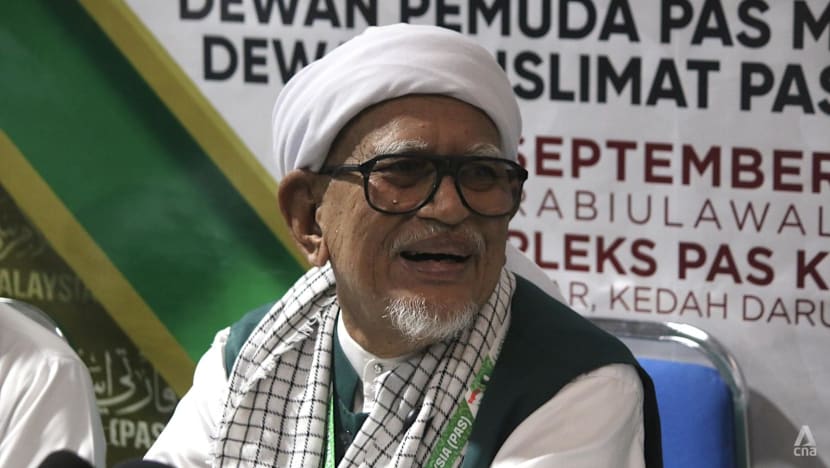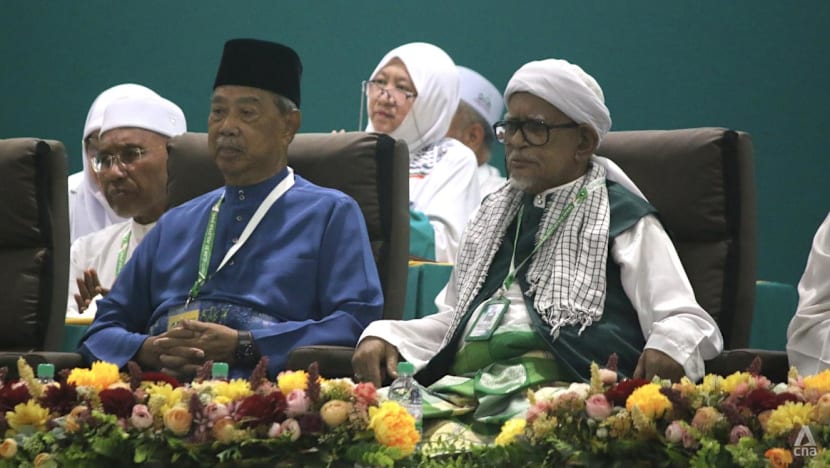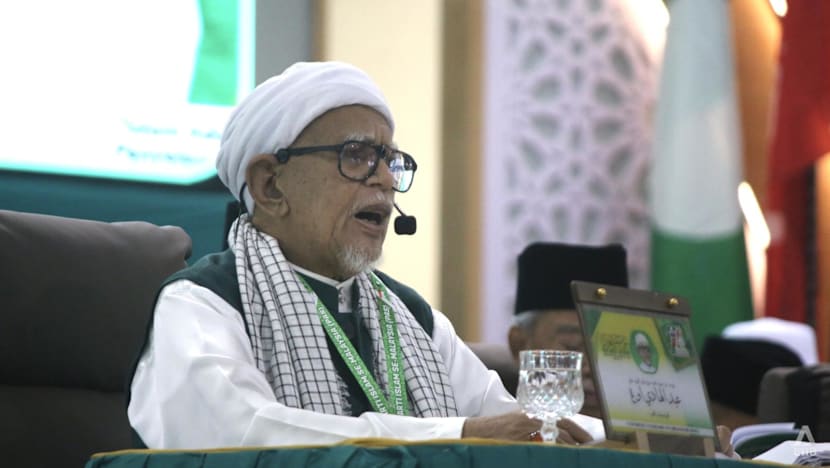Malaysia’s Islamist party PAS aims to govern in 3 new states including Selangor, eyes bigger national role
Parti Islam Se-Malaysia is ready to lead Malaysia and respect the sensitivities of non-Muslims, says its president Abdul Hadi Awang.

Parti Islam Se-Malaysia president Abdul Hadi Awang speaking to reporters at the party's annual general assembly on Sep 15, 2025. (Photo: CNA/Aqil Haziq Mahmud)

This audio is generated by an AI tool.
ALOR SETAR, Kedah: Malaysia’s opposition Parti Islam Se-Malaysia (PAS) has drawn the first battle lines as it declared its interest in wresting the Pahang, Perak and Selangor states from the incumbent coalition, by winning the legislative elections and forming the new local governments there.
PAS president Abdul Hadi Awang revealed these new goals at the party’s annual general meeting on Monday (Sep 15), as he pledged that the Islamist party would lead the country’s “pluralistic” society without neglecting the rights of non-Muslim communities.
This even as he took an apparent jibe at Malaysia Prime Minister Anwar Ibrahim and his Malaysia Madani slogan that the premier unveiled after he took power in November 2022.
In his policy speech at the event held in Kedah, Hadi said PAS has an “obligation to safeguard” both its state and parliamentary seats at upcoming electoral contests, referring to both the state legislative polls and the country’s general elections.
Hadi described the PAS-governed states of Kelantan, Terengganu, Kedah and Perlis as “base states” that must be defended while the party advances an “Islamic agenda” in accordance with the states’ jurisdictions.
“Meanwhile, the next victories are expected to come from Pahang, Perak, and Selangor, thereby strengthening PAS and PN’s representation in parliament, while also boosting achievements in the southern states and in Sabah, which will soon face its state election,” he said, referring to the Perikatan Nasional opposition coalition.
There is a well-known belief among PAS leadership that its governance of states like Terengganu and Kedah should be seen as a signal that it can manage the country at the federal level, and that a wider state-level presence - especially in state governments - would boost this impression.
Malaysia has two levels of elections: One at the federal level that elects Members of Parliament for the House of Representatives, and at the state level, which elects members for the state legislative assemblies.
STATE-LEVEL AMBITIONS
Hadi’s roughly 45-minute speech, in a hall full of PAS delegates clad in white, was regularly punctured by the party’s rallying cry of “takbir”, or a call to praise God. Also in attendance were leaders of PN component parties, including Parti Pribumi Bersatu Malaysia (Bersatu) president Muhyiddin Yassin.

Of the three incumbent-held states that it has earmarked for possible victories, PAS has the second-most seats in the Pahang state assembly (15 out of 47 seats) and the Perak state assembly (17 out of 59 seats).
And during the 2023 state elections, PAS stunned observers by claiming 10 seats in the Pakatan Harapan (PH) stronghold of Selangor, whose state assembly has 56 seats.
In a press conference after his speech on Monday, Hadi explained that victories in Pahang, Perak and Selangor were a “possibility” due to what he feels is PAS’ significant support in these states.
“If UMNO worked with us (after the Pahang and Perak state elections in 2022), we would have formed the state governments there. Unfortunately, UMNO broke apart; they joined the DAP (Democratic Action Party),” he told reporters, referring to the United Malays National Organisation.
The 15th general election (GE15) in November 2022 was UMNO's worst performance in history, as the party only managed to win 27 seats and 31 per cent of the popular vote.
The election results led to a hung parliament, and after royal intervention, the UMNO-led Barisan Nasional coalition eventually formed a unity government with Anwar’s PH coalition and other parties. PAS and Bersatu became the opposition.
The DAP - a Chinese-majority PH component party - has a long-standing rivalry with PAS due to perceived differences in political ideology.
The Pahang and Perak state elections were held concurrently with GE15, while the Selangor polls were held about a year later in August 2023.
Meanwhile, a slew of state elections - chiefly in Sabah, Melaka, Johor and Sarawak - are expected to be held between now and 2028, by when the next general election is due.
NATIONAL POWER
At GE15, PAS emerged as the party with the most seats by winning 43 of the 222 seats in parliament.
Hadi on Monday urged PAS to build on its “greatest success” of the previous general election, as the party sets its sights on winning 80 seats at the next general election.
“Therefore, it is our duty to continue the struggle, for sustaining victory is more challenging than attaining it,” he said.
At the press conference, Hadi also addressed questions of whether PAS would name its own prime minister candidate by repeating what party leaders had previously said.
“We are ready to lead Malaysia and our priority is to get support and win the election. The issue of choosing who will be leader - that will be settled internally,” he said, adding that the candidate should ideally be someone who is younger than 70.
Recently, several PAS leaders had criticised Bersatu for being “overly enthusiastic” in naming its prime minister candidate without coalition consensus.
Separately, PAS will also retain Hadi as its president and Tuan Ibrahim Tuan Man as deputy president. This after the two won unopposed in the party’s internal elections that was to be held during the two-day general assembly.
The party’s three vice-president posts - held by Idris Ahmad, Amar Abdullah and Ahmad Samsuri Mokhtar - were also uncontested after election director Muhammad Sanusi Md Nor dropped out of the race.
The no-contest for PAS’ top five posts leaves only its central working committee facing a contest, with delegates expected to cast their votes on Monday evening.
APPEALING TO NON-MALAYS
PAS, for all its popularity in the Malay heartlands, has often been criticised for failing to appeal to the non-Malay population, an issue that party leaders have acknowledged in the past few days of the assembly, which officially runs from Sep 11 to 16.
The party will uphold the the sanctity of the Federal Constitution with the “true interpretation of Islam”, without neglecting the rights and interests of other communities, Hadi reassured.
He added that PAS is committed to upholding Islamic tenets regarding non-Muslim citizens, including respecting the sensitivities of non-Muslims even in matters “relating to the belief in God”.
Hadi stressed that PAS bureaus overseeing unity and preaching, and a wing staffed by non-Muslim members, bear “crucial” roles in engaging constituencies with a non-Muslim majority as well as securing decisive votes in Muslim-majority areas.
“This approach must be strategically structured and impactful, whether through participation in state governments or by assuring non-Muslims that their religious rights will remain protected under PAS leadership,” he said.

Even so, Hadi took aim at Anwar’s Malaysia Madani (Civil Malaysia) slogan, which the premier said was also meant to reset the country’s direction on race and religion.
While Malaysia’s pillar would still be the Malay majority with an emphasis on the principles of Islam, the Malay language and Malay rights, the country is also a multi-racial nation, where no one should not be left behind in the country’s development, Anwar said in 2023 when introducing the slogan.
“True madani is when Islam holds authority to govern human affairs,” Hadi said on Monday.
“The problem, however, is that Malaysia Madani has been reduced to a mere slogan used to deceive the people with a shallow understanding devoid of true knowledge. It serves only as empty rhetoric without genuine direction or guidance.”
PAS’ STANCE ON GEOPOLITICS
Hadi also touched on geopolitical events shaping the world at the moment, in a sign of PAS’ federal government ambitions.
The ongoing Russia-Ukraine war is being fuelled by “Western provocations against neighbouring states that challenge its dominance”, Hadi claimed, while asserting that Israel’s “brutality” in the Gaza conflict has contributed to its increasing isolation in the international community.
But Hadi chose to single out the “situation” in the South China Sea as one that demanded “serious attention”, saying it is best addressed through “diplomacy and strengthened ties among regional states”.
China claims most of the resource-rich South China Sea, while a number of Southeast Asian nations including Malaysia are claimant states.
“Lessons must be drawn from the experience of the two World Wars, in which the peoples of colonised nations, which serve as the battleground, ended up with casualties far greater than those of the major powers who waged the conflicts,” said Hadi.
“We therefore expect the government to act with greater prudence and firmness, maintaining a neutral stance to ensure that Southeast Asia does not once again become a battleground for rival superpowers or a proxy to any side.”



















